- Home
- Terry C. Johnston
Trumpet on the Land: The Aftermath of Custer's Massacre, 1876 tp-10 Page 5
Trumpet on the Land: The Aftermath of Custer's Massacre, 1876 tp-10 Read online
Page 5
Regimental commander Eugene Carr looked up from the three-page dispatch when King rode up to join the other officers gathered in the lieutenant colonel’s office. Outside, the sun was setting in a clear Kansas sky as the regiment’s band encircled the flagpole for retreat, raising the brassy strains of “Soldaten Lieder” as the Stars and Stripes came down. Some couples interrupted their croquet game on the parade to take up the waltz amid children in their bright dresses and knee britches playing blindman’s buff or rolling hoops along the graveled walks.
Carr grinned toothily, much satisfied with himself. “What did I tell you, gentlemen?”
With his ruddy skin drawn tightly over his cheekbones, King asked, “News from the front?”
Carr rattled the pages with eagerness, saying, “I told you Crook would need the Fifth!”
“Hurrah!” was the immediate cheer raised right then and on through that night in all the barracks and officers’ quarters, sounded with the most proper John Bull, or Irish, or German accents. “We’re going for to join Crook!”
The next morning the lieutenant colonel had fired off a telegram requesting of Sheridan, “Please authorize me Wm. F. Cody at Cheyenne. Could I get Pawnees as Indian Scouts; I had them in sixty-nine.”
Sheridan promptly wired back, “You can employ Cody. Will try to obtain Pawnees, but doubt success.”
On the night of 5 June Companies A, B, D, and K departed Fort Hays, railed west to Denver, then north to Cheyenne, where on the seventh Major John J. Upham met them with his battalion of Companies I, C, and G ordered up from Fort Gibson and Camp Supply in Indian Territory. A day later M Company arrived from Fort Lyon, Colorado Territory. Then on the ninth King was asked to ride in to Cheyenne rail station, there to await the arrival of no less than Buffalo Bill Cody himself, expected on the semiweekly westbound. What a joyous stir that reunion had caused for the veterans of the sixty-nine campaign in the regiment to see the famous scout and their beloved regimental commander side by side once more.
“With them two together,” cheered one of the old noncoms, “the Fighting Fifth is ready to get the jump on all the Sitting Bulls and Crazy Horses in the hull danged Sioux tribe!”
Two days later eight companies of mounted troopers set away for Fort Laramie, where they were told they would receive orders from Division Headquarters.
King hadn’t fought the Sioux or Cheyenne before, only Apache in the southwestern deserts of Arizona Territory, a land of cactus and centipede, where he was seriously wounded and narrowly escaped capture during a fierce skirmish at Sunset Pass. Without question, to a veteran Indian fighter like the lieutenant, the campaign trail was far preferable to fort duty.
This was a fighting outfit, the Fifth Cavalry. First organized in 1855, the regiment saw its initial Indian service across the arid plains of west Texas, fighting Lipan, Tonkawa, and the fierce Comanche until the outbreak of the rebellion in the South.
In 1866 when Albany-born and Milwaukee-raised King graduated from West Point, he was carrying on for his famous father, Rufus King, himself a member of the class of thirty-three. With the first shot fired at Fort Sumter in the Civil War, the senior King quickly set about organizing the legendary Iron Brigade, of which he became major general following the regiment’s defense of Washington City. Young Charles accompanied his father in those early months of the war as a mounted orderly, a volunteer position without pay. Firsthand he watched the formation of the famous Army of the Potomac, but before he could become a part of it, young King received his appointment to the U.S. Military Academy from President Lincoln. He was bound and determined to make something of himself, coming from such a distinguished bloodline: Grandfather King, another Charles, served as president of Columbia College, and Great-grandfather had been a signer of the Constitution of the United States and the last candidate of the Federalist party for President.
On Reconstruction duty in the South after graduation, King’s battery of light artillery was often called out to quell riots. The mere arrival of his platoon with their Gatling guns never failed to disperse the noisy crowds of rabble. Three years later he was assigned to recruiting duty in Cincinnati, where in off-duty hours he played with the Red Stockings, a pioneer professional baseball team.
In 1870 he was promoted to first lieutenant and assigned to the Fifth Cavalry, then stationed at Fort McPherson, where he first saw the famous scout Bill Cody. It was while he was serving in detached duty in New Orleans that King married Adelaide Lavender Yorke. In seventy-four Charles rejoined his regiment at Camp Verde in Arizona. Many were the times he remembered the fierce fights at Diamond Butte and Black Mesa, but nothing awoke him at night like nightmares he suffered remembering that fight at Sunset Pass on the first day of November 1874. If Sergeant Bernard Taylor hadn’t pulled King over his shoulder and carried the lieutenant out of those rocks …
Charles tried hard to think on other things when those vivid, black memories returned to haunt him. The wound kept King from active duty for more than a year, but at least he survived.
About the time he returned to his K Company, the Fifth was being transferred back to the plains, and by the time King arrived back in Kansas, Carr appointed him regimental adjutant as the nation began to murmur rumors of one final campaign to end the Indian troubles on the northern plains.
Now, here at Laramie, in the midst of so many officers’ wives with their husbands already off to the north with Crook, Charles dwelt that much more often on his sweet Adelaide, who had elected to stay behind with her parents in New Orleans. How his heart yearned to walk across this parade with her, to sit beside her, to hold her hand and gaze into her eyes with that longing only youth can know.
How his heart burned to have her with him now, more painfully than ever. Charles knew it would be a long, long while before this business with the hostile bands was wrapped up and put behind them. Something told him that warm evening late in June that this would not be a short summer’s campaign.
Something like a whisper, haunting Charles King. And sitting here in these evening shadows at Fort Laramie, the lieutenant began to fear their business with the Sioux and Cheyenne would not only boil over into the fall and on into the winter, but that the mess it caused would be very, very nasty indeed.
Already Bill missed Lulu, the warm sun causing his skin to sweat beneath the thin shirt. Any breeze at all cooled him as he led the column of fours on and on across the rolling wilderness.
Cody thought on her as he squinted into the sundrenched distance, remembering land like this from that summer they caught Tall Bull at Summit Springs.* Lulu looked so damned good under a sunbonnet, a parasol coyly laid over her shoulder where she could spin it, cocking her head to the side and making him fall in love with her all over again. He remembered the sight of all those children dashing across the Fort Laramie parade, scurrying all about officers’ quarters and Bedlam too, changed from bachelor officers’ quarters to housing the wives and families of men already off to war with Crook’s Wyoming column. Young children made him think on Kitty, wondering if he could have done something different, if he hadn’t been away from home so much, if … but he had to admit that even if he had been around more, he doubted there was much a father could do to protect his only son from the scourge of scarlet fever.
Out here Bill Cody could do something, perhaps even something heroic. But when it came to saving young Kit Carson Cody in those final hours and minutes before he stopped breathing in his father’s arms—William F. Cody would have to live with that failure for the rest of his life.
“There’s a feeder trail, Cody,” Sheridan explained days ago, hunched over the map table where Carr and many of the Fifth’s officers had circled in tight-lipped conference.
“A trail that I imagine goes right from here, and over here,” Bill had replied that fourteenth day of June, jabbing a finger at the Red Cloud and Spotted Tail agencies, then dragging the finger dramatically across the sepia-toned paper, “all the way north to the hostiles raising hell in the
Powder River and Rosebud country, right there.”
“General Carr,” Sheridan said, using the lieutenant colonel’s brevet rank awarded for bravery in battle during the civil war, as he straightened, “I’m wanting to use your Fifth to block that trail north.”
Carr appeared dismayed, asking, “But you’re not sending us north to unite with General Crook?”
“No. Jordan down at Red Cloud has been hammering out reports to me every day on his situation there. I want to use your force to block this trail to the Powder River country. I’ve already sent Crook a dispatch detailing my plans to use you to the east of him. You are, after all, the commander of an entirely new district in my department, the District of the Black Hills.”
“Yes,” Carr replied.
In recent days Sheridan had indeed carved out a new military district for Carr and the Fifth Cavalry: embracing portions of western Nebraska and Dakota, along with a slice of eastern Wyoming Territory that ran up to but did not include Fort Fetterman. Carr’s primary task would be protection of the settlers pouring into the Black Hills townships now that the government was seriously going about the business of reclaiming the sacred Paha Sapa from the Sioux and Cheyenne.
“Schuyler?”
“Yes, General?” said Walter S. Schuyler.
Sheridan stood even taller that afternoon days ago, still the shortest man there in that assembly of officers. “Read General Carr my orders.”
“Yes, sir,” the lieutenant replied, opening up the folded orders pulled from a thin leather valise he carried over one shoulder. Turning to Carr, Schuyler read, “The lieutenant general commanding directs you to proceed, with the eight companies of the Fifth Cavalry, on the road from Fort Laramie to Custer City until you reach the crossing of the main Powder River trail leading from the vicinity of Red Cloud Agency westward to Powder and Yellowstone rivers. Arriving at that point, you will follow the trail westward, proceeding such distances as your judgment and the amount of supplies which you carry will warrant. As little is known about the country over which you will operate, the lieutenant general … does not wish to hamper you with any official instructions, but will leave you to operate in accordance with your best judgment.”
As Schuyler refolded the orders and presented them to Carr, Sheridan asked, “You have any questions, General?”
“None, sir.”
“You understand I don’t want to tie your hands with the letter of these orders.”
“Understood, sir.”
“I want you and Cody to figure out where the hell the hostiles are and strike them—just like the two of you did in sixty-nine.”
For a moment Carr glanced at his civilian scout before turning back to the commander of the entire division that was erupting into full-scale war. “Make no mistake, General. We will accomplish our objective.”
“Very well,” Sheridan replied. “Let’s cut off Sitting Bull and Crazy Horse from all hope of reinforcements.”
Outfitted with rations for thirty-seven days, Carr’s column had pulled away from its huge camp pitched a mile east of Fort Laramie on 22 June. In their ten days at the post, trader John S. Collins did a land-office business with those reinforcements about to push off to war. Cody pulled up the corner of the long bandanna he had loosely knotted around his neck and swiped at his forehead, dragging it across his eyes, then blinked into the shimmering distance once more.
Recalling that first day after riding up from Cheyenne with Lieutenant King, striding over to the post trader’s to see if Collins had some little something he could not live without.
The hushed but excited voices trailed the buckskinned scout across the parade.
“That’s Bill Cody!” was one not-so-muffled whisper. “Buffalo Bill?”
“That’s him!”
“I heard he’s here to guide for the Fifth!”
Inside the cool shadows of the sutler’s store, Bill had busied himself studying the cases of all things essential here on frontier duty as the hubbub grew behind him, more and more people squeezing through the door to take a look for themselves, young children forced to crowd through adult legs to take a peek and gawk at him for themselves.
“Mr. Cody?”
He straightened and turned immediately at the soft, feminine song to the voice, sweeping his broad-brimmed hat from his head gallantly, his eyes as quickly sweeping across the woman’s beautiful face, the doelike eyes, those high cheekbones brushed with a natural blush, her full lips exposing but a hint of straight teeth, all atop that long, white neck. Bill felt the natural pull that for but an instant gave him desire to flirt with this beauty. That is, until his eyes dropped from the neck, past the rounded bosom, and he saw the expanse of her belly.
“M-ma’am?” he stuttered. “It is ma’am, isn’t it?”
She held out her hand. “Yes.”
Good, he thought. After all, the woman was with child. An officer’s wife, sitting out her pregnancy in this frontier post. He congratulated himself for suffering Lulu through only one of her three pregnancies at Fort McPherson.
“You are William F. Cody?”
“I am.”
“You are the scout who served with the Fifth Cavalry during the summer of sixty-nine when you discovered Tall Bull’s village of Dog Soldiers at Summit Springs in Colorado Territory?”
His eyes narrowed a bit as the hushed room inched closer about them both, anxious to overhear every bit of conversation. “Yes?”
“Then you are the scout who rescued one of the two women held captive by that rogue band of warriors.”
Swallowing, Bill could think of nothing more to do but nod, then again answered, “Y-yes?”
She suddenly smiled, those teeth and those eyes lighting up that tiny, shady trading post, re-presenting him her hand.
He took it, held it, mystified at it all, until she explained.
“I am so very pleased to meet you, Mr. Cody. My husband has told me so very much about his time with you—chasing horse thieves all the way north to the Elephant Corral in Denver City. When we ourselves visited Denver last fall, he showed me that very same place and explained how you got the jump on the criminals.”
“E-elephant Corral … he was with me?”
“All the way through for the Summit Springs fight.”
“Your name … I’m afraid I didn’t catch it, ma’am.”
“Oh, dear. Now it’s my turn to apologize,” she said, removing her hand from his and holding it flat against her bosom. “It’s only that I suppose I felt I know you already, sir—why, the way Seamus has talked and talked and talked about you so.”
“S-seamus?”
“I’m Samantha Donegan.”
“S-samantha … Seamus Donegan?” he gasped. “You’re … he’s … don’t tell me he … gone and got married, has he?”
“Last summer,” she replied, then patted her swollen belly. “And now this. With Seamus gone north to scout for General Crook—”
Cody roared. “Ain’t that just like an Irishman now? To marry as beautiful a woman as there ever was on the plains … then go galloping off to the Indian wars once he’s got her with child!”
*The Plainsmen Series, Vol. 4, Black Sun.
Chapter 4
22-24 June 1876
“Samantha!”
She heard her name called out and leaped to peer down from the tiny window in her upstairs room. Across the Fort Laramie parade hurried Elizabeth Burt, wife of Captain Andrew S. Burt of the Ninth Infantry, waving a sheaf of yellow papers in the breeze like a bright clutch of radiant sunflowers as she dashed over the green lawn, her skirts and petticoats maddeningly a’swirl at her ankles like sea foam.
“Oh, dear God,” Sam prayed aloud, “don’t let this be … bad news,” then cradled her hands atop her swelling belly.
“Samantha!”
Sam turned back to the window, looking down on Elizabeth again, flagging the handful of yellow telegraph flimsies at the end of her arm. And she calmed herself, thinking that Mrs. Burt would
n’t be hurrying so, shouting out at her, if it was bad news she carried.
With a swallow Samantha turned and gazed down at her belly, patting her bulk reassuringly a moment before she dashed from the room and lumbered ungainly down the narrow stairs to the landing, where more than a dozen women poured through the front door onto the porch in an eager crush of skirts and bodices, all swishing below a cacophony of voices excited yet etched with dread.
For a moment Sam held at the last step, gripping the newel in her right hand, wishing him back here with all her might. She licked her lip as the others flooded onto the porch, where Elizabeth Burt began passing out the telegram pages on which the key operator had scrawled each message.
Word from the war.
They already knew there had been a big fight—something on the order of a week ago now. By the time word of that battle reached Fort Fetterman and was relayed down the telegraph wire to Fort Laramie, already the Indians camped all about the post spoke of hearing on the moccasin telegraph of a great fight wherein the army was bested. Those rumors were only whispered, conveyed in hushed tones, until Crook’s official report of the fight reached Laramie, disproving the worst fears that the Big Horn and Yellowstone Expedition had suffered a massacre. From that moment on it was only a matter of waiting out the agonizing days until each wife learned if her husband would be among the cold, sterile numbers Crook listed for Sheridan’s headquarters: was a loved one among the dead or wounded, a casualty of that great fight?
Taking a moment at the landing to tug down her bodice, Samantha straightened the apron over her belly and quartered through the open doorway as if she were bigger than she really was. More and more every week it seemed she was having to learn all over again how to move around in a body that always seemed to conspire against her.
“Here’s yours, Samantha,” Elizabeth said, rattling the yellow page aloft over others’ shoulders. “Oh, dear,” she said, sudden worry in her voice as she moved through the crush toward Samantha. “It’s good news! Trust me—he’s all right.”

 Black Sun, The Battle of Summit Springs, 1869
Black Sun, The Battle of Summit Springs, 1869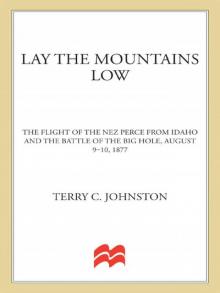 Lay the Mountains Low
Lay the Mountains Low Black Sun: The Battle of Summit Springs, 1869 (The Plainsmen Series)
Black Sun: The Battle of Summit Springs, 1869 (The Plainsmen Series)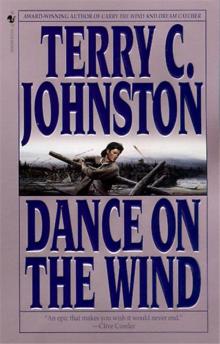 Dance on the Wind tb-1
Dance on the Wind tb-1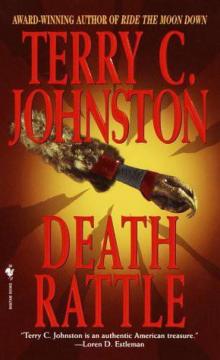 Death Rattle tb-8
Death Rattle tb-8 The Stalkers
The Stalkers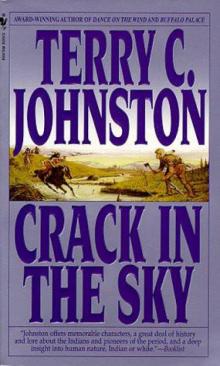 Crack in the Sky tb-3
Crack in the Sky tb-3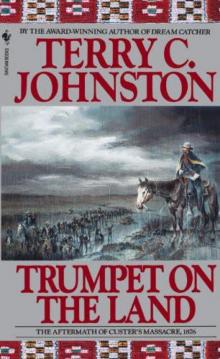 Trumpet on the Land: The Aftermath of Custer's Massacre, 1876 tp-10
Trumpet on the Land: The Aftermath of Custer's Massacre, 1876 tp-10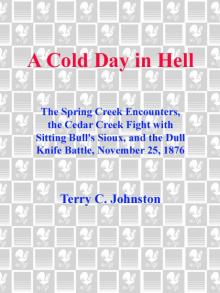 A Cold Day in Hell
A Cold Day in Hell Long Winter Gone: Son of the Plains - Volume 1
Long Winter Gone: Son of the Plains - Volume 1 Buffalo Palace
Buffalo Palace Cries from the Earth
Cries from the Earth Death Rattle
Death Rattle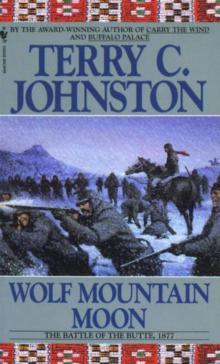 Wolf Mountain Moon: The Battle of the Butte, 1877 tp-12
Wolf Mountain Moon: The Battle of the Butte, 1877 tp-12 Crack in the Sky
Crack in the Sky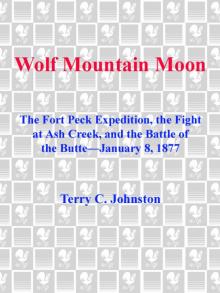 Wolf Mountain Moon
Wolf Mountain Moon Turn the Stars Upside Down: The Last Days and Tragic Death of Crazy Horse
Turn the Stars Upside Down: The Last Days and Tragic Death of Crazy Horse Winter Rain
Winter Rain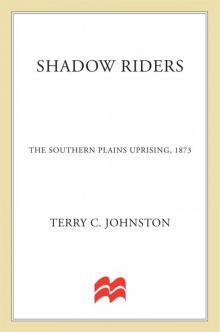 Shadow Riders: The Southern Plains Uprising, 1873 (The Plainsmen Series)
Shadow Riders: The Southern Plains Uprising, 1873 (The Plainsmen Series)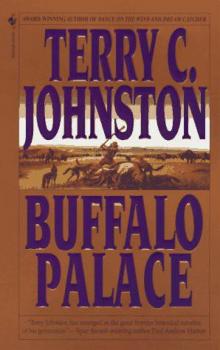 Buffalo Palace tb-2
Buffalo Palace tb-2 Cries from the Earth: The Outbreak Of the Nez Perce War and the Battle of White Bird Canyon June 17, 1877 (The Plainsmen Series)
Cries from the Earth: The Outbreak Of the Nez Perce War and the Battle of White Bird Canyon June 17, 1877 (The Plainsmen Series)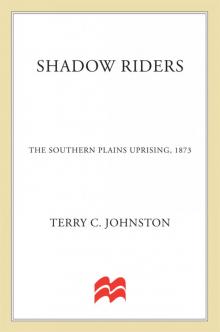 Shadow Riders, The Southern Plains Uprising, 1873
Shadow Riders, The Southern Plains Uprising, 1873 Ashes of Heaven (The Plainsmen Series)
Ashes of Heaven (The Plainsmen Series) Ashes of Heaven
Ashes of Heaven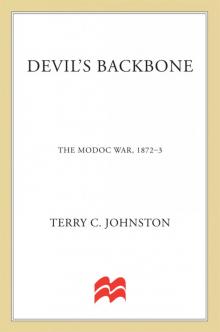 Devil's Backbone: The Modoc War, 1872-3
Devil's Backbone: The Modoc War, 1872-3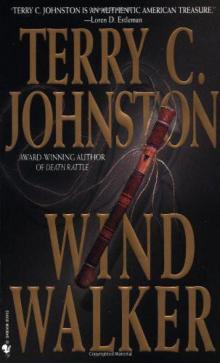 Wind Walker tb-9
Wind Walker tb-9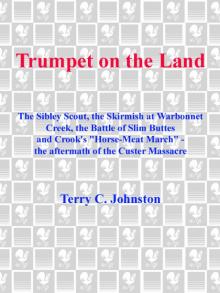 Trumpet on the Land
Trumpet on the Land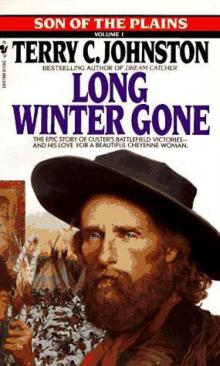 Long Winter Gone sotp-1
Long Winter Gone sotp-1 Dying Thunder
Dying Thunder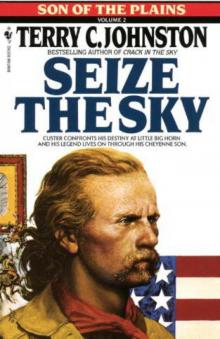 Seize the Sky sotp-2
Seize the Sky sotp-2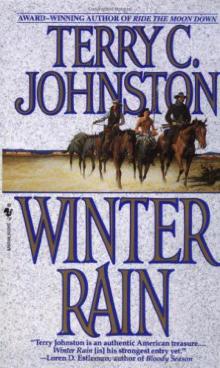 Winter Rain jh-2
Winter Rain jh-2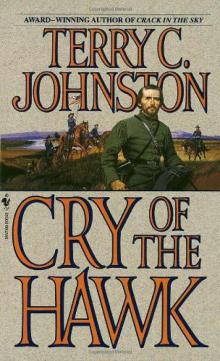 Cry of the Hawk jh-1
Cry of the Hawk jh-1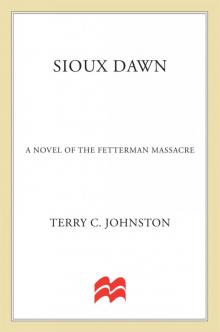 Sioux Dawn, The Fetterman Massacre, 1866
Sioux Dawn, The Fetterman Massacre, 1866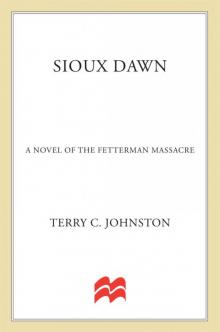 Sioux Dawn: The Fetterman Massacre, 1866 (The Plainsmen Series)
Sioux Dawn: The Fetterman Massacre, 1866 (The Plainsmen Series) Ride the Moon Down
Ride the Moon Down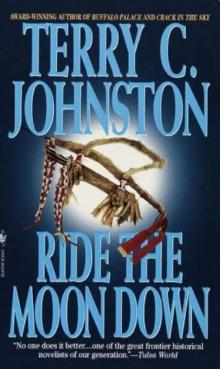 Ride the Moon Down tb-7
Ride the Moon Down tb-7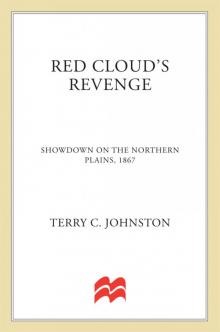 Red Cloud's Revenge
Red Cloud's Revenge Wind Walker
Wind Walker